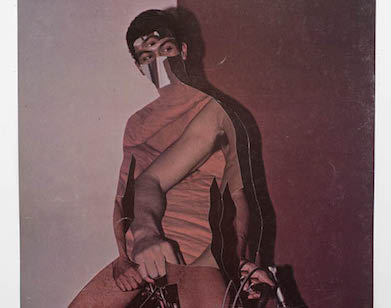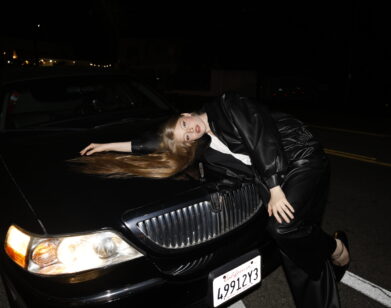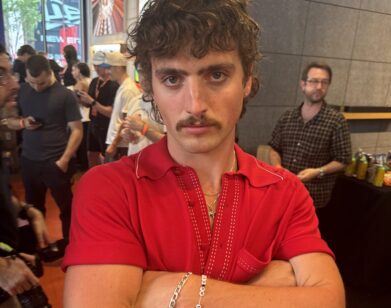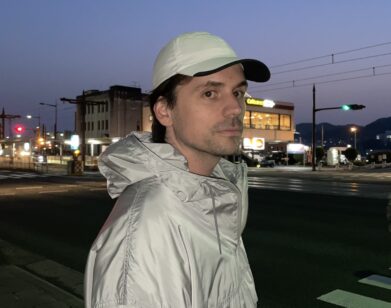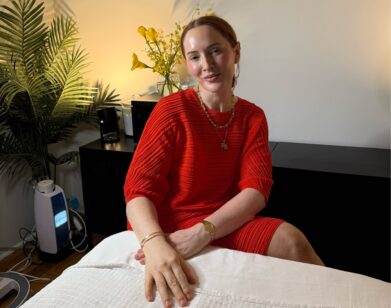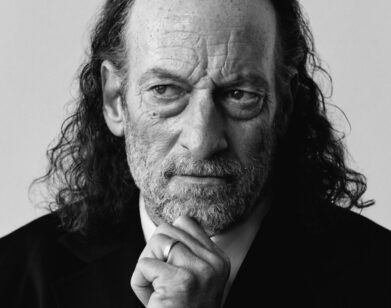PUNK
Xiu Xiu and Vaginal Davis on Berlin, Bible-Thumpers, and Designer Drugs
“One of my favorite pastimes is avoiding people,” said Vaginal Davis when she met up with Jamie Stewart and Angela Seo of Xiu Xiu for tacos in Berlin. The California-born, Berlin-based experimental musicians couldn’t agree more. Known for their bleak lyricism, the cult band drops their newest album tomorrow, 13″ Frank Beltrame Italian Stiletto with Bison Horn Grips, and they’ve just kicked off their world tour, which Stewart considers a “boogie embrace for queer perverts across the universe.” Lucky for us, they decided to mark the occasion with their old friend Vaginal Davis, the riotous icon of queer punk art and former Afro Sisters band member, who wrapped up her first major international solo exhibition in Stockholm last week. After raving about their shared history of schoolyard diss tracks and their mutual disdain for America, they chatted about everything from the oddly specific (“Ash Wednesday is one of my favorite things”) to the unnervingly existential: “What the fuck am I going to be doing for the next 20, 30, 40 years of my life?”
———
VAGINAL DAVIS: We are having our tacos at the Manifesto. The restaurant is Alebrijes.
ANGELA SEO: Oh, yes. The best of Berlin.
JAMIE STEWART: What do we give these tacos? A solid B?
DAVIS: B-plus. They’re better than I thought they would be.
STEWART: The tortillas were decent. The nopales were passable. You live close to here?
DAVIS: Walking distance. There used to be a smaller mall here, and then they built this hideous monstrosity, the Mall of Berlin, just a short walk away. It also has some horrible political ramifications too, of taking advantage of the workers and whatnot.
STEWART: Oh.
DAVIS: But malls are so archaic now. It’s ridiculous to have malls.
STEWART: There’s a surprising number of functioning malls in Berlin.
SEO: Berlin is retro.
STEWART: It’s the city where styles go to never die.
DAVIS: Hector was telling me that the Beverly Center is empty all the time. I remember when it opened. You’re probably a little too young to remember.
STEWART: I certainly went there, though.
DAVIS: And the Pacific Design Center. That’s how far back I go. Did you know that at the Pacific Design Center back in the ’70s, there used to be a disco? It was called Julie’s.
SEO: How was it?
DAVIS: Not very good. And at the bottom of the Beverly Center used to be a disco. It went through different incarnations.
SEO: If there was one thing you could bring from L.A. and put here in Berlin, what would it be?
DAVIS: Well, there’s a lot of things, but so many of those things don’t even exist anymore in L.A., like diners. There was a diner that used to be on Beverly Boulevard before you got to La Cienega, and it was owned by the same owners of Astro Family Restaurant in Silver Lake. I think it was called Jan’s. Jan’s was great and they made amazing pastramis.
SEO: What was the clientele like?
DAVIS: It was just your typical diner clientele. A lot of working class people. But because it’s close to Beverly Hills, there would be occasional celebrities there. Somehow there was a little less canned food at Jan’s than some of their other places. Hector says Astro Family is inedible now.
STEWART: Oh, we’ll try it.
SEO: What would you bring here from L.A.?
STEWART: More cute people.
SEO: Ouch.
DAVIS: There’s cute people here in Berlin.
STEWART: Yeah, but the ratio is significantly smaller. Angela and I go to the same gym, and we were saying that one of the pleasures of going to the gym is that you get to see hot people working out. But it’s not one of the pleasures of our gym.
DAVIS: Is it a cruising gym?
STEWART: Not at all. I mean, it’s a fairly shallow motivation.
DAVIS: I love it. What about you, Angela?
SEO: I feel like every city really needs a proper Asian invasion.
STEWART: You want more Asian people.
SEO: There’s plenty of Asian people here in Berlin, but I want a proper invasion. I want there to be some top-notch Asian food from all across the board. I want my H Mart. Even the ravers and rice rockets. I just want it to be Asian Asian.
STEWART: So between the three of us, the amalgamated answer is we miss food and people. But why else live, if not for those things?
DAVIS: I’m surprised that you guys have lasted here, because you’re so Southern California. Many international stars come here to perform, but this is a hard-knock place to live.
SEO: Why didn’t you guys tell us before? You’re like, “Come to Berlin, come to Berlin. It’ll be great.”
STEWART: Well, you stayed, too. How long have you been here?
DAVIS: 20 years.
STEWART: Okay. We haven’t even been here for two years. Why did you stay for 20 years with no plans to go back?
DAVIS: God forbid, I couldn’t imagine living in the U.S.
STEWART: We feel the same.
SEO: Well, Miami’s got its own type of hot people.
DAVIS: Yeah, but it’s not a hotness that anyone can tolerate. I’ve only been to Miami once and I said, “I never want to come here again.”
SEO: My only memory of touring in Florida was in 2010 in Northern Florida. It’s a very different story than Southern Florida. Northern Florida is like alligator marshes. I remember taking a little walk after soundcheck, and people are out on the strip drinking. There’s huge, mud-covered trucks, people with backwards trucker hats, and this giant Monster energy drink truck and skimpily clad women who are maybe a 4 out of 10—
STEWART: Ouch.
SEO: But very skimpily dressed, tossing up Monster cans, and this woman who is huge with a giant snake wrapped around her. I just was like, “I’m going to go back to the venue now and sit backstage until we play.”
DAVIS: I think touring in our day and age is brave. I could never handle it when I was young.
STEWART: What got you started in bands?
DAVIS: Back in those days, I didn’t even consider it being in a band. It was just a natural extension like your arm or your leg. You made zines, you did art, you made films, and you did a music project. I didn’t think of it as like the Rolling Stones or something. It was always just an extension of art.
STEWART: What was the first one you were in?
DAVIS: I guess it was the Afro Sisters, but it was more of a performance art project. It started in junior high school with me and Fertile [La Toyah Jackson]. We would use an old-fashioned tape recorder from Radio Shack. Fertile had a DJ set. We’d just talk shit about people over different records.
STEWART: That’s spectacular.
DAVIS: Just a thing to amuse ourselves, and then we made these little cassette tapes and we would just give them as presents to friends. That’s how it started.
STEWART: Oh my god. When I was in junior high, it was almost the exact same thing. The band was the Lime Green Leisure Suits. We did Weird Al Yankovic style, making up new words to current songs. We would just play the cassette and sing over it. We did mean songs about other kids in the class, but then we would sell the tapes to those kids.
DAVIS: You guys are such capitalists.
STEWART: By the end of the year, we were very, very unpopular.
DAVIS: Kapitalismus.
STEWART: Mean-spirited kapitalismus.
DAVIS: So this is way before Ten in a Swear Jar. When I met you, you had Ten in a Swear Jar.
STEWART: Yeah, at Club Sucker.
DAVIS: Was that your first band?
STEWART: No, I played in a band before that. It was almost all the same people, called IBOPA.
DAVIS: I know IBOPA also played at Club Sucker. You guys grew up in the San Fernando Valley?
STEWART: Yeah.
DAVIS: What is it like? It’s so separate from the rest of Los Angeles. I see it as this place that has no sidewalks. It’s just endless streets and malls.
STEWART: That’s not inaccurate. I didn’t really feel like my life started until I started going over the hill. That’s when I saw Ben Is Dead, as The Onyx was beginning to fade.
DAVIS: Oh my god, The Onyx.
STEWART: That’s where I started hanging out.
DAVIS: People who are young don’t remember this, but the whole coffee house thing didn’t really exist until around the mid-’80s. Before that there were very few places where you could get a cappuccino. One of the only few places where you could get a cappuccino was this upscale supermarket on Sunset and Fairfax, which was called the Chalet Gourmet. Until then, it was just filter coffees. But the only two places that I remember ever going to in the Valley was Godzilla’s, which was a punk rock club—
STEWART: Where was that?
DAVIS: In North Hollywood by the Stern Brothers.
STEWART: I might’ve been too little.
DAVIS: And then before that there was a teen disco called the Sugar Shack in North Hollywood.
STEWART: I remember hearing about the Sugar Shack, but I didn’t ever go there.
SEO: Yeah, I quickly left the Valley as soon as I got out of high school. But it was interesting because it’s a suburb, but it has extreme proximity to L.A. proper and Hollywood. It’s a weird metaphor of being a teenager in close proximity to what is adult, but you’re not totally in there. That’s what the Valley was like.
STEWART: And everybody has to drive a car there, whereas I grew up in a family where no one had a car.
SEO: I have a question. For me and a lot of my friends, our whole thing was, “We want to escape from here.”
STEWART: To the smog-filled grid. Escape the provincial and go to the big city.
SEO: Right. But then having grown up in the city, what drives that impulse? If it’s not an escape from a specific place, what is it?
DAVIS: That’s a good question because when I was young, I saw myself at a very early age being an internationalist. I started letter-writing at a young age and having pen pals around the world. That got me out of the myopia of being someone who was born and raised in Southern California. It was just a pipe dream to live the way my life is now. This career of being an artist, it’s unheard of, because a lot of people who I grew up with are in prison or dead. Those are the two options. Like my two nephews. The fact that I made it to 63 is miraculous.
STEWART: And a long way to go.
DAVIS: Well, I don’t know about that.
SEO: I mean, you’re just taking medication to have a margarita right afterwards.
STEWART: You’re clearly indestructible. Do you feel like moving to Berlin kept you from ending up on that track?
DAVIS: Oh, yes. It was the best thing that ever happened. Of course, at the time, I didn’t realize that. I was just desperate, and I already had an infrastructure of friends here.
SEO: Earlier, you also mentioned how art was your way of creating a protective self. I am kind of curious, what did it feel like it was protecting you from?
DAVIS: Well, my persona protected me from the AIDS crisis. I’m one of those people who doesn’t even want to catch a cold from anyone, let alone a sexually transmitted disease. At that time, HIV and AIDS were a death sentence. Friends like Ron Athey got diagnosed with HIV in their twenties. You don’t know how many funerals there were back in those days. I was so frightened of sex that I just sort of cut myself off and created this persona that was so outrageous and brutal and scary. When I’m on stage, I’m a different person. So even if someone was attracted to me, the persona would scare them away.
STEWART: Was being able to be so over-the-top about your verbal expression of sex a way of having sex?
DAVIS: Exactly. And there’s always the religious damage aspect.
SEO: The religious damage is real.
STEWART: Angela, you also grew up in a family that was often struggling economically and didn’t have an arts background. Because of that parallel with Vag, do you feel like now, later in life, art is a mode of protecting your true self?
SEO: I don’t know, being protective seems to mean drawing a boundary or a wall. Whereas for me, the process is more about breaking down walls. Growing up, because of my background, there was always a wall between who I am and what I’m allowed to be. I didn’t feel like I could do art or music or participate in certain forms of expression. That’s also a religious thing, too. We grew up being told to value what we have because it’s more than enough and you feel almost guilty for wanting more. It’s that Protestant mindset of living on little and just being thankful for it. And while that’s all true, it’s unhealthy to be discounting the amount of joy—I hate to use the word “joy” because I know how much you hate it, Jamie.
STEWART: It’s widely and inappropriately used.
SEO: But even talking about sexual pleasure, we are always taught that pleasure is wrong and happiness is somehow not okay. There’s good things and I should be able to enjoy them, but it’s a really weird part of me conditioned to not do that. I think it’s a result of growing up in working class communities where there’s a lot of hardship going on and you see people around you in worse off conditions.
DAVIS: My mother is a Black French Creole from Louisiana, so she’s Catholic, but she kind of ran away from her religion of her birth. It’s funny that more recently I’ve been sort of, not embracing that religion, but—
STEWART: Catholicism?
DAVIS: Yeah, Roman Catholicism. There’s this church that does the old-fashioned mass in Latin, and I love rituals.
SEO: Me too. Ash Wednesday is one of my favorite things.
STEWART: We both have pretty churchy upbringings, but in very different ways. Maybe a year before the pandemic, we were going to this Episcopalian Church in L.A. I guess they call it the “smells and bells” church because there was so much incense and so much beautiful singing.
SEO: But the clergy was all led by queer people.
STEWART: The pastor was butch, like a bulldag.
DAVIS: A hot bulldag.
STEWART: It was nice to be in a place with that level of ritual where the politics were more embracing.
DAVIS: My mother was always searching constantly. Even though she grew up as a Roman Catholic, being Black French Creole, she was always investigating eastern religions and Buddhism and whatnot. And then she got into the Jehovah’s Witnesses in the late ’50s. As a child, I went to the Jehovah’s Witnesses theocratic ministry school, which I enjoyed, because I did really well taking tests. And with the Jehovah’s Witnesses, it’s all about study and supplication.
SEO: I used to know the order of the New Testament.
DAVIS: Me too. I thought the minute I went to school, they were going to ask me that. And I actually enjoyed proselytizing and getting to know my neighbors.
SEO: So are you doing any proselytizing through your art?
DAVIS: I think I do. Me and Ron always talk about this because he has evangelical roots and he was trained to be a preacher as a child. It has fucked me up in some ways, but I’ve embraced that and utilized that instead of running completely away from it. There is a preachy element to what I do and some of the personas that I’ve created, like my self-proclaimed saint, Saint Salisha Tate. She would give this sermon called “Theocracy, yes. Fornication, nooo.”
STEWART: I like those O’s.
DAVIS: But getting back to you, and your writing with Xiu Xiu and in general, which I described as like Denton Welchian. It’s a literary device that you use. You are a very smart person. Sometimes through fiction, you’re able to tell more truths than if you actually wrote everything exactly as it happened. I think your writing is like some of the Southern writers like Carson McCullers.
STEWART: I’m a big Carson fan. I take that as a deep compliment.
DAVIS: And I see Eudora Welty, Faulkner. I even see German writers like Margarete Böhme.
STEWART: That’s really nice of you, Vag.
SEO: I mean, for somebody who makes so much art about all the really kind of dark and sexy and traumatic things in life—
DAVIS: But very, very sexy.
SEO: In person, I think you’re like Vag. You’re a little bit of recluse. You’re very introverted. So is that your protective persona?
STEWART: I was always really shy since I was a kid, but even more so as I get older. Music is certainly a protective device, but I mean, I am fucking nuts. It’s a way to put all that negative energy into something that isn’t self-destructive. It’s more to protect myself from myself than from the outside world. Although a lot of things about the outside world are what make me nuts.
DAVIS: Who can blame you?
STEWART: Fair enough.
DAVIS: The two of you have backgrounds in classical music, learning how to play the piano and violin and at church.
SEO: Yeah, but I never took formal lessons. It was just with the neighbor who could play piano.
DAVIS: I always longed for those kinds of things that I saw that middle class kids have.
SEO: That was because of this connection that we had with classical music and being middle class and Westernized. That’s why so many Asian kids get sent to piano and violin lessons, but that was also why I could not really accept the piano as a main instrument because I wanted the opposite. I wanted to be punk rock. I wanted to be an Afro Sister. I didn’t want to play the piano like all the other Asian kids, let alone be considered a middle class Asian kid, which I felt like the furthest thing from. Only later as an adult was I able to see the piano as an awesome instrument in itself beyond our class associations.
DAVIS: Well, when I met people in the punk scene and in university who were middle class and upper middle class, I realized that they don’t have it so great actually, because a lot of their relationships are so transactional. When I met these kids of movie stars who had been punk rockers and who went to UCLA, I realized that growing up as a rich white kid is not all that it’s cracked up to be. I didn’t really realize that until I actually met rich white kids.
SEO: It’s not, but they have a leg up on a lot of us. And if you’re not taking advantage of that, then shame on you.
DAVIS: There was so much neglect and melancholy that was so troubling, and it gave me a different perspective instead of being envious of them. A lot of them had never known someone from the ghetto before, someone who was poor. So it was this exchange. That’s why you can’t just dismiss people. That’s another aspect that I’ve put into my art, too. Especially with different collaborations with different kinds of people. Like meeting you at Club Sucker when you were just a little weenager. I saw this really open quality about you, and the way you were on stage.
STEWART: I learned a lot of that from you, my dear.
SEO: I feel like we’ve been talking a lot about the past, but now that you’ve brought up age, it’s an interesting time to think about what the fuck am I going to be doing for the next 20, 30, 40 years of my life. Do you guys ever think about that?
DAVIS: Well, it’s difficult because we haven’t been, as a species, very good caretakers of the planet, and that weighs on me a lot. That’s why I can’t ever fault people who just want to check out by just doing tons of drugs and getting super high or people who just want to be in a darkroom in a sling with next, next, next. I’m not a drug-oriented person, but I drank a lot more back in the day. Me and Rick Owens would be at the Spotlight at 6:00 A.M. when it was opening, before I would go to work at UCLA at 8:00.
SEO: What is your way of dealing with the inevitable end of the earth as we know it?
DAVIS: You have to just keep smiling through it the best you can because all good things come to an end eventually.
STEWART: Including our planet.
DAVIS: We just have to usher in the new species and say, “Okay, we’ve had our time. Now it’s this other species’ time.”
STEWART: Welcome, superior crows.
SEO: Is that how you’re dealing with your future daily? Resignation?
STEWART: No, I do drugs.
DAVIS: Oh.
SEO: Okay.
DAVIS: He’s on bath salts right now.
SEO: Lovely.
STEWART: That’s why I’m in such a good mood.
DAVIS: And the new hot drug from Amsterdam, Dookie, you’re on it.
STEWART: Oh, yeah. I really like Dookie.
DAVIS: He loves Dookie.
SEO: That just reminds me of Green Day.
STEWART: I like that it’s a suppository.
DAVIS: It’s the hottest designer drug.
STEWART: It’s like a two-liter bottle of Diet Coke.
SEO: I get it. You guys have no plans for your future.
STEWART: Other than more and more Dookie.
DAVIS: Our plan is to do as much Dookie as we can.
SEO: And welcoming the aliens.
STEWART: Come, come, nuclear war and zombie alien overlords.
SEO: All right. That’s it. Thanks guys. Goodbye.


